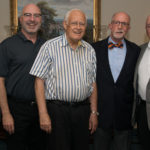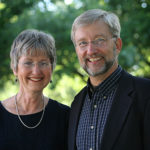Thanks to an editor (oh, how they—OK, we—sometimes mess things up), the tiniest but most prominent It Thing of this summer goes by an unfortunate nickname. Unless you've been sucked into a black hole, you've heard of the Higgs boson. It's the subatomic particle whose function mechanically explains why the world is something and not nothing. It's the reason mass exists in the universe. As one of its discoverers, Fabiola Gianotti, told Time magazine after the discovery was announced July 4, "Without mass, the universe would not be the way it is." Without the Higgs boson, human beings wouldn't exist. Planets, stars and galaxies wouldn't exist.
The Higgs boson's first name derives from Peter Higgs, the English physicist who theorized its existence in 1964. And "boson" is the scientific word for—and I'm being precise here—teeny-tiny, eensy-weensy, really, really, really itsy-bitsy stuff.
But the Higgs boson's nickname dates to 1993, when an American physicist, Leon Lederman, wrote a book about it. Lederman wanted to call it "the (compound word that, if you said it, ensured your mother would wash your mouth out with soap) particle." An editor suggested an elegant shorter version of the name, "the God particle."

Bad choice of words. Even though verification of the Higgs boson may represent the most significant scientific achievement of the new millennium, it's not as big of a deal as its nickname suggests. Raise your hand if, when you first saw "the God particle" in a headline, you plowed into the story to see if scientists had discovered a subatomic something that explains and/or verifies the existence of God. Me, too.
Of course, the Higgs boson is not all that. Still, it is wonderful and absolutely essential. The Higgs boson enables matter to possess mass, or weight, which in turn enables it to adhere together. Without the Higgs boson, every atom on earth would be, in Gianotti's words, "nothing but quarks and electrons and a lot of empty space." And now that scientists know the Higgs boson actually exists, they may be able to figure out other physical wonders, such as how gravity works and the nature of "dark matter," the invisible substance they believe comprises 80 percent of the universe. A physicist's work is never done.
Unfortunately, discovery of the Higgs boson set off the same old science vs. religion debate that has accompanied every major scientific breakthrough since the 16th century, when Roman Catholic censors first countered Nicolaus Copernicus' theory that Earth was not the center of the universe and, in fact, orbited the sun. Too often, scientists point to new discoveries as proof of God's nonexistence or irrelevance, and religionists get scared and defensive.
Lawrence Krauss, a theoretical physicist at Arizona State University, claimed proof of the Higgs boson "posits a new story of our creation" that does not require God, according to reports in Newsweek and Religion News Service. "If we can describe the laws of nature back to the beginning of time without any supernatural shenanigans, it becomes clear that you don't need God," he said.
Thankfully, brilliant and faithful scholars have presented different interpretations.
Sign up for our weekly edition and get all our headlines in your inbox on Thursdays
Guy Consolmagno, a Vatican astronomer, wrote a Washington Post column, also reported by RNS, explaining scientific discoveries reveal the "personality" of God. "The mysteries revealed by modern science are a constant reminder that reality is bigger than our day-to-day lives," he said. And medical writer Deepak Chopra added the Higgs boson testifies to divine interconnectedness of all creation. "It only strengthens the notion that the universe comes out of a nothingness which is everything," he explained, echoing Genesis 1.
More than perhaps any scientific discovery, the parallel between the Higgs boson's mechanics and Genesis' everything-from-nothing creation story illustrates why people of faith need not fear science. The more science learns about creation, the closer—not further—we draw to the Creator.














We seek to connect God’s story and God’s people around the world. To learn more about God’s story, click here.
Send comments and feedback to Eric Black, our editor. For comments to be published, please specify “letter to the editor.” Maximum length for publication is 300 words.